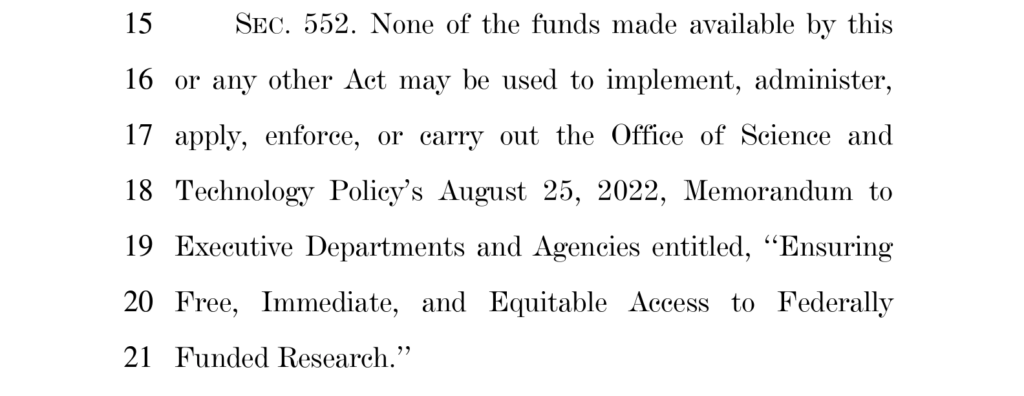
A couple of weeks ago the U.S. House Appropriations Subcommittee on Commerce, Justice, and Science (CJS) released an appropriations bill containing language that would defund efforts to implement a federal, zero-embargo open access policy for federally funded research.
We think this is a fantastically bad idea. One of the most important developments in the movement for open access to scholarship came last year when Dr. Alondra Nelson, Director of the Office of Science and Technology Policy, issued a memorandum mandating that all federal agencies that sponsor research put in place policies to ensure immediate open access to published research, as well as access to research data. The agencies are at various stages of implementing the Nelson memo now, but work is well underway. This appropriations bill specifically targets those implementation efforts and would prevent any federal government expenditures from being used to further them.
For the vast majority of scholarly works, the primary objective of the authors is to share their research as widely as possible. Open access achieves that for authors (if they can only get their publishers to agree). The work is already funded, already paid for. As you might imagine, those opposed to the memo are primarily publishers who have resisted adapting the business model they’ve built of putting a paywall in front of publicly-funded work, largely for profit.
Thankfully, the CJS appropriations bill, one of twelve appropriation bills, is just a first crack at how to fund the government in the coming year. The Senate, of course, will have their say, as will the President. With the current division in Congress, combined with the upcoming recess (Congress will be on recess in August and reconvene in September), the smart bet is that none of these bills will be enacted in time for the federal government’s new fiscal year on October 1. Instead, a continuing resolution–funding the government under the status quo, as Congress frequently does–will likely be enacted as a stop gap until a compromise can be reached later in the year.
It is important, however, that legislators understand that this attempt to defund OA efforts is majorly concerning, especially for authors, universities, and libraries that believe that federally funded research should be widely available on an open access basis. It’s a good moment to speak out. SPARC has put together a helpful issue page on this bill, complete with sample text for how to write to your representative or senator.
As you’ll see if you read the proposed appropriations bill, it is loaded with politics. The relevant OSTP memo language is located amongst other clauses that defund the Biden administration’s efforts to implement diversity initiatives at various agencies, address gun violence, sue states over redistricting, and dozens of other hot-button issues as well. It’s pretty easy for an issue like access to science to get lost in the political shuffle, but we hope with some attention from authors and others, it won’t.
Discover more from Authors Alliance
Subscribe to get the latest posts sent to your email.
